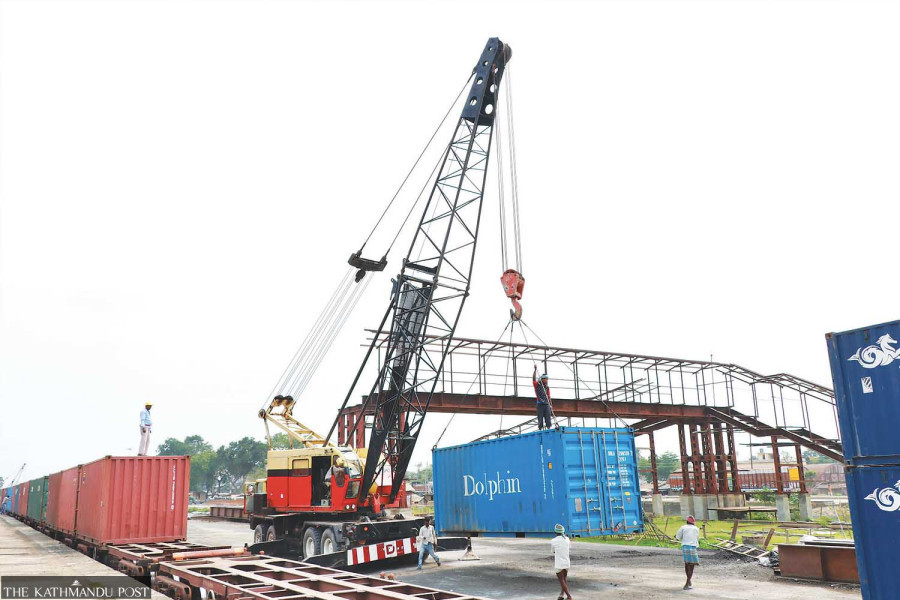Money
Weeks after auto-renewal of trade treaty with India, Nepal wants revision
The bilateral trade treaty was automatically renewed in November without addressing several of Nepal’s concerns.
Krishana Prasain
Nepal and India have agreed to renew the bilateral treaty on transit, and also to discuss the treaty on trade, which was automatically renewed in November without addressing several of Nepal’s concerns. This agreement was reached during the Nepal-India Inter-Governmental Sub-Committee (IGSC) on Trade, Transit, and Cooperation to Combat Unauthorised Trade held in Kathmandu on January 11 and 12.
With the automatic renewal of the Nepal-India trade treaty in November last year, trade experts said that Nepal lost an opportunity to negotiate and amend a few Articles important for the country to boost bilateral trade.
The trade treaty was first inked in 1978 and the latest renewal was made in November 2023 without changes. It is renewed every seven years.
“Both neighbours agreed to resolve issues relating to trade and transit by revisiting the trade treaty,” said Ram Chandra Tiwari, joint secretary at the Ministry of Industry, Commerce and Supplies.
Officials say the tentative date for the revision has not been fixed, but it could happen soon.
Shri Vipul Bansal, joint secretary of the Ministry of Commerce, India, led the Indian delegation.
According to the participants, there were detailed discussions on bilateral trade, transit, customs, quarantine, setting up food testing labs, and developing and upgrading trade-related infrastructure at the border.
“We also discussed operating the Jogbani-Biratnagar railway and facilitating cargo-handling by India,” said Tiwari.
The two countries discussed upgrading existing quarantine labs and accepting each other’s lab certificates, he said.
“Discussions were also held on removing obstacles for Nepali goods to the Indian market,” Tiwari said.
The Nepali side raised the recurring bans by India on the export of various food items including wheat, rice, sugar and onion. Such bans have been fueling inflation and smuggling in Nepal.
“To tackle the ongoing smuggling of goods from India to Nepal, the two sides agreed to strengthen mechanisms in the field,” said Tiwari.
According to experts at the South Asia Watch on Trade, Economics and Environment (SAWTEE), a Kathmandu-based think-tank, removing duty-free market access to India for primary agricultural products will allow Nepal to levy duties on the heavily subsidised Indian agricultural goods.
According to SAWTEE research, Nepal can’t afford to continue to provide tariff-free access to Indian agricultural products. Therefore, select primary agricultural products, including cereals, must be removed from the list of primary products on which both countries are currently providing reciprocal tariff-free access.
Nepali jute products have been subjected to anti-dumping duties in India for the past seven years. In theory, according to SAWTEE, dumping is said to occur when goods are exported for less than they are sold in the domestic market or third-country markets, or at less than the production cost. Nepali jute products manufacturers say they are not doing so.
India is Nepal’s largest trading partner, accounting for more than 65 percent of its total trade.
According to the Department of Customs, the year-on-year imports from India to Nepal, in 2019-20, jumped to Rs735.29 billion.
It further increased to Rs971.60 billion in 2020-21. Imports started ballooning and crossed the trillion mark in 2021-22, reaching Rs1.20 trillion, the highest-ever on record.
The imports, however, dropped to Rs1.02 trillion in the last fiscal year that ended in mid-July 2023.
Likewise, exports from Nepal to India in 2019-20 were at Rs70.10 billion, which increased to Rs106.37 billion in 2020-21.
Exports, too, kept increasing and reached a historic high of Rs155.22 billion in 2021-22. In the past fiscal year, exports dropped by 31.26 percent to Rs106.68 billion.
The trade deficit with India, currently, stands at Rs921.16 billion.
Trade experts said that increasing trade deficit, failure to participate in the value chain, presence of non-tariff barriers, preference erosion and adverse impact of the treaty on primary and agriculture sectors are the emerging trade issues between Nepal and India.
A press statement issued by Nepal’s Industry Ministry on Sunday said India is ready to address the issues raised by the Nepal side to ease cargo movements through the Biratnagar-Bhairahawa border points.
Discussions were held on removing weight restrictions for cargo trucks plying the Kakarvitta-Phulbari-Banglabandha trade highway by reviewing the transit treaty, according to the statement.
Also in the agenda were expanding Indian railroads to the integrated checkpoints in Bhairahawa and Dodhara-Chandani in Mahendranagar, which are currently under construction.
Similarly, Nepal and India discussed setting up well-facilitated food labs at major Nepal-India trade border points including Panitanki, Jogbani, Nautanwa, Nepalgunj road and Banbasa.
The food labs can be established at customs points or elsewhere, the statement said.
The meeting agreed to conduct a fourth phase technical meeting to review the trade treaty between Nepal and India for the expansion of bilateral trade and to minimise Nepal’s rising trade deficit.
According to a press statement issued by the Embassy of India in Kathmandu, there were extensive discussions on ways to bolster trade and investment ties.
“Both sides discussed mutual market access for pharmaceuticals and Ayurvedic products. The Indian side highlighted the need for an intellectual property rights regime under the Paris Convention for encouraging foreign direct investment,” said the press statement issued by the Indian embassy in Kathmandu.
The agenda also covered discussions on the review of the Treaty of Transit and the Treaty of Trade, proposed amendments to existing agreements, strategies for enhancing investment, harmonising standards, and synchronised development of trade infrastructure, according to the press statement.
“One of the highlights of this meeting was the focus on bilateral initiatives aimed at further strengthening the seamless cross-border connectivity between India and Nepal through the construction of new integrated check posts and railway links,” the press statement reads.
“Both sides were committed to implementing these initiatives, reflecting the shared vision of prosperous bilateral trade.”




 8.22°C Kathmandu
8.22°C Kathmandu














